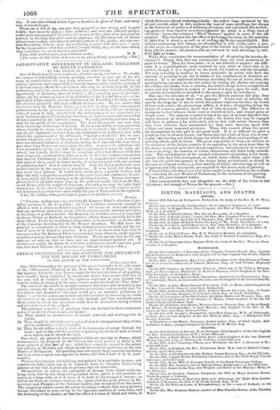CONSERVATIVE GOVERNMENT IN IRELAND: EXCLUSION OF ROMAN CATHOLICS.
TO THE EDITOR OF Tile SPECTATOR.
Sue—I thank you for your courteous attention to my last letter. No doubt, the essence of impartiality, strictly speaking, consists, as you say, in the ab- sence of consideration for any party whatever. In the actual condition of society, however, such impartiality is utterly impracticable ; and the putting of it forward merely affords to a statesman who may be desirous to profit by his professions, and at the same time to evade the performance of them, a plausible opportunity of sheltering himself behind a lofty-sounding general principle. Above all, the relative position of the Catholics of the United Kingdom, as re- gards their fellow subjects who are followers of the Established Church, renders this abstract partiality still more difficult of observance. No one knows this fact better than Sir Roamer PEEL; yet, as if in mockery of his own repeated protestations, he has permitted himself to give to Ireland, with one exception, (who, if report be true, already feels the awkwardness of his situation,) the most thorough-paced Ultra-Orange Government that has been inflicted on that ill-fated country for the last half-century. We shall probably not have long to wait for the result of this experiment. The Lord-Lieutenant can have very little knowledge of the state of Ireland. He is surrounded by zealous partisans, whose vivacity he seems not much disposed to moderate ; the Catholics, one and all, are rigorously excluded from any participation in political power, with which the appointment of Mr. O'LEARY, " though a Catholic," has no con- nexion whatever; and yet, Sir, you say I have not proved my case, because I have not adduced instances of Catholics having been rejected who were better men than their Protestant competitors for office. A moment's reflection will, I am persuaded, satisfy you that the proof you require is not to be easily ob- tained; but I really think it must be conceded, either that Roman Catholics were designedly excluded from office as such, or that the millions who profess that form of Christianity in this realm are of so degraded and inferior a caste that none of them could be found worthy of being intrusted with any portion of political power.' It is in vain to deny it. Alas, the liberal professions were melted into air by the majority of ninety-one. It were better far that they had never been uttered. It would have saved many a painful feeling ; and, they who held a lingering confidence in the good faith and consistency of pub- lic men, might still have indulged in the pleasing delusion. Strange metamor- phoses have at all times taken place in the political world ; but as to Sir Ho- BERT PEEL, with his weight of character, attempting to copy the light, tepid insouciance of his clever but unprincipled predecessor, as well might a turtle- fed Alderman hope to perform successfully the part of TAG LIONI in the Sylphide.
I am, Mr. Editor, with great respect, your most obedient servant, Jtixtes.
[ * Custom, perhap necessity, restricts Sir ROBERT PEEL'S selection of vi- lified servants to the Tory party : are Tory Catholics numerous enough to afford so wide a choice as JULIUS implies? Of course we could not suppose that any practical statesman could strictly observe merely abstract principles in his choice of public servants : Sir ROBERT, for instance, cannot be expected to choose Whigs or Radicals to fill political offices, though specially fitted for those offices. Yet he has manifested a disposition to do even this; as in the offer of the Canadian Secretaryship to Mr. HENRY But.wen. We laid down the principle as a landmark, to show in what abstract justice consisted, and the ex- tent of error to be traced in practice. It is yet to be shown that that error is excessive—that Sir ROBERT PEEL has excluded those whom he could appoint to political power, because they were Catholics. We do not say that he has not done so; we only say that we have seen no single instance pointed out. If JULIUS can supply the defect, be will settle a discussion which must not grow into that most tiresome thing a controversy without an object.—En.


























 Previous page
Previous page